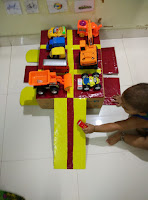"Why is my child learning to throw trash in a dustbin, put footwear in a shoe rack or wipe off water spills when they should be learning how to do something more academic, like ABC, 123?"
Math, reading, and language all require one to have the ability to focus, to be able to complete a task with logical and sequential steps, to concentrate, to make intelligent choices, and to see a task from start to finish. This is precisely the intent of the Practical Life activities. Through the Practical Life work, children learn to calmly go about their work and to take pleasure and satisfaction from their efforts.
Practical Life activities are the activities of everyday life and they are involved in all aspects of life. The child observes these activities in the environment and gains knowledge through the real experience of how to accomplish life skills in a purposeful way. These activities help give the child a sense of being and belonging, established through participation in daily life with us. The child feels important and gains self-esteem. He learns to trust that he and his environment will be cared for and his needs satisfied.
During the child’s sensitive period between birth and 6, the child is constructing the inner building blocks of his person. It is therefore important for the child to participate in activities to prepare him for his environment, that allow him to grow independently and use his motor skills, as well as allow the child to analyze difficulties he may have in the exercise and problem solve successfully.
Montessori also saw the child’s need for order, repetition, and succession in movements. Practical Life Exercises also helps to aid the child to develop his coordination in movement, his balance and his gracefulness in his environment as well as his need to develop the power of being silent.
Do you involve your child in household chores? I would love to know about your experiences, questions or comments if any :)
Source:
Info Montessori
Montessori Guide
Montessori Training
Math, reading, and language all require one to have the ability to focus, to be able to complete a task with logical and sequential steps, to concentrate, to make intelligent choices, and to see a task from start to finish. This is precisely the intent of the Practical Life activities. Through the Practical Life work, children learn to calmly go about their work and to take pleasure and satisfaction from their efforts.
Practical Life activities are the activities of everyday life and they are involved in all aspects of life. The child observes these activities in the environment and gains knowledge through the real experience of how to accomplish life skills in a purposeful way. These activities help give the child a sense of being and belonging, established through participation in daily life with us. The child feels important and gains self-esteem. He learns to trust that he and his environment will be cared for and his needs satisfied.
During the child’s sensitive period between birth and 6, the child is constructing the inner building blocks of his person. It is therefore important for the child to participate in activities to prepare him for his environment, that allow him to grow independently and use his motor skills, as well as allow the child to analyze difficulties he may have in the exercise and problem solve successfully.
Montessori also saw the child’s need for order, repetition, and succession in movements. Practical Life Exercises also helps to aid the child to develop his coordination in movement, his balance and his gracefulness in his environment as well as his need to develop the power of being silent.
“A child who becomes a master of his acts through long and repeated exercises of practical life, and who has been encouraged by the pleasant and interesting activities in which he has been engaged, is a child filled with health and joy and remarkable for his calmness and discipline” ~ The Discovery the ChildHere in this video, is my 18 months old son doing some such activities.
Do you involve your child in household chores? I would love to know about your experiences, questions or comments if any :)
Source:
Info Montessori
Montessori Guide
Montessori Training





























